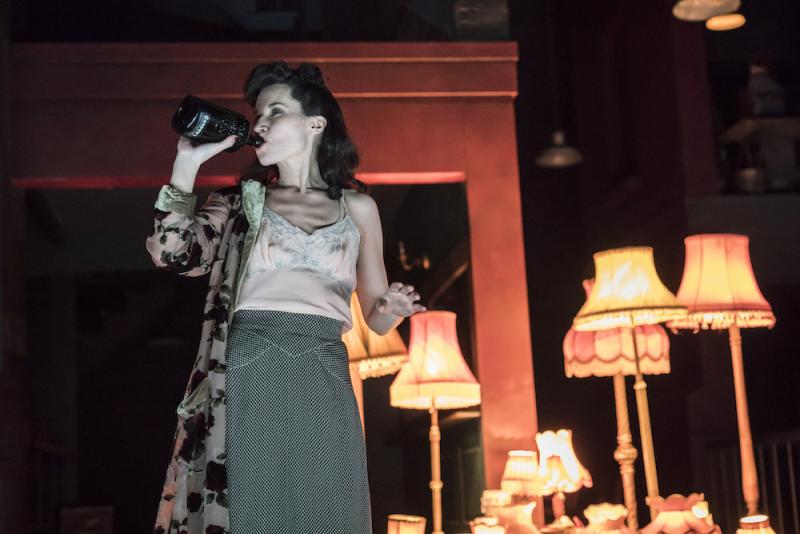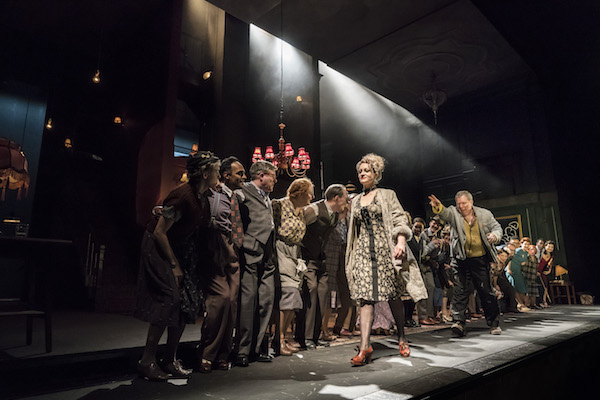Absolute Hell, National Theatre review - high gloss show saves over-rated classic | reviews, news & interviews
Absolute Hell, National Theatre review - high gloss show saves over-rated classic
Absolute Hell, National Theatre review - high gloss show saves over-rated classic
Energetic revival of Rodney Ackland’s best play exposes many of its faults

Rodney Ackland must be the most well-known forgotten man in postwar British theatre. His legend goes like this: Absolute Hell was originally titled The Pink Room, and first staged in 1952 at the Lyric Hammersmith, where it got a critical mauling. The Sunday Times’s Harold Hobson said that the audience “had the impression of being present, if not at the death of talent, at least at its very serious illness”.
Now it's back at the National Theatre, where its originally shocking seediness and cast of drunks, gays, lesbians, soldiers, queens and 24-hour party people gets the glossiest of make-overs. Set in a Soho drinking club, La Vie en Rose, on the eve of the Labour landslide victory in the 1945 General Election, the play shows how some people hide from psychological reality and social change by various form of escapism, notably drink. Christine, the place's proprietress, is a solitary 39-year-old whose frantic sociability stems from a chronic fear of being left alone. Her regular customers are a cross-section of bohemian arty types and layabouts.
Truth is less glamorous, but more sane, than myth
These include Hugh Marriner, a once-famous writer now working for the Ministry of Information, who worries about his lover Nigel, a dress designer who sleeps with a female patron in order to finance his business, and also tries to butter up Maurice, a film director on the look out for scripts. Then there’s red-haired Elizabeth, who lives with Siegfried, an Austrian refugee and black market spiv. Others include Mrs Marriner, Hugh’s mother; Julia, an old lady suffering from dementia; the camp Lady Lettice (aka The Treacle Queen); the noisy failed artist Michael; the bible-bashing sectarian Madge and the streetwalking prostitute Fifi. Plus countless soldiers, and others.
In his revision of the original play, Ackland made the sexuality of his characters more explicit, and took his revenge on Hobson by creating the character of R B Monody, a pompous, grumpy lesbian critic who is subjected to a page-long vigorous tirade by Hugh. Most of the other characters, who were condemned as unpatriotic degenerates in the 1950s, now have more call on our sympathies. A straight GI, who thinks paying for sex is somehow an insult to his manhood, ignores the come-ons of a female prostitute and has fun with a man instead – sexual fluidity Soho style.
But, watching this three-hour version, you have plenty of time not only to admire Ackland’s cameos, but also to question whether this play really is a masterpiece. In the absence of anything that could be enjoyed as a plot, there is an accumulation of incidents that the generous will call Chekhovian, but the more disenchanted will admit are pretty pointless. There is a repetitiveness about the dialogues and the action that makes a point about the senselessness of drunken escapism, then makes the same point again. And again. And again. Likewise, the major climax about Ravensbrück concentration camp depends on an eye-wateringly unlikely coincidence, while the final collapse of the building’s ceiling is scarcely a subtle metaphor. Still, for all its weaknesses as a drama, the play does provide a picture of postwar Britain that reeks of disenchantment and fumes with honest cynicism. Here is a society in which the bohemians, who are meant to be progressive, are actually pathetic day-dreamers unable to comprehend what happened in the Nazi concentration camps and are even unaware of the political changes occurring just across the road, where the Labour Party offices are (here given added contemporary relevance with a towering election poster that trumpets Labour’s plege to build new homes). This deliberately anti-heroic portrait of the state of the nation is a powerful antidote to the romantic wartime patriotism of the Blitz spirit. In Brexit Britain, it is a valuable reminder that truth is less glamorous, but more sane, than myth.
Still, for all its weaknesses as a drama, the play does provide a picture of postwar Britain that reeks of disenchantment and fumes with honest cynicism. Here is a society in which the bohemians, who are meant to be progressive, are actually pathetic day-dreamers unable to comprehend what happened in the Nazi concentration camps and are even unaware of the political changes occurring just across the road, where the Labour Party offices are (here given added contemporary relevance with a towering election poster that trumpets Labour’s plege to build new homes). This deliberately anti-heroic portrait of the state of the nation is a powerful antidote to the romantic wartime patriotism of the Blitz spirit. In Brexit Britain, it is a valuable reminder that truth is less glamorous, but more sane, than myth.
Director Joe Hill-Gibbins takes this over-rated play and injects it with well-paced energy and some well-organised visual effects (pictured above), although his version is not immune from a certain messiness. The huge cast sings; the cast dances; distant rooms are glimpsed on Lizzie Clachan’s huge and elaborate set, which manages to dwarf the actual seedy club room at its centre. Fifi the prostitute walks up and down like a spectural sexual presence. As the play stumbles its increasingly squiffy way to its downbeat conclusion, the explosions of hectic activity, the stop-go dancing and the vivid light changes remind us that theatre today must be entertaining as well as emotionally engaging. And maybe that’s the problem here – the cast is overwhelmed by the production.
So Kate Fleetwood (to my mind too glamorous an actress to play this squalid character) as Christine struggles to connect us to her plight, although Charles Edwards is more successful in conveying the range of Hugh’s self-pitying emotions. Of the numerous cameos, my favourites are Danny Webb’s Siegfried, Lloyd Hutchinson’s Michael, Jonathan Slinger’s Maurice, Prasanna Puwanarajah’s Nigel and Eileen Walsh’s hilarious Madge. Their good work goes a long way to saving what is hyped as a classic, but is actually not such a very good play. Perhaps the 1950s’ critics were right after all. Absolute Hell is fun, but this time the show is better than the writing.
rating
Explore topics
Share this article
The future of Arts Journalism
You can stop theartsdesk.com closing!
We urgently need financing to survive. Our fundraising drive has thus far raised £49,000 but we need to reach £100,000 or we will be forced to close. Please contribute here: https://gofund.me/c3f6033d
And if you can forward this information to anyone who might assist, we’d be grateful.

Subscribe to theartsdesk.com
Thank you for continuing to read our work on theartsdesk.com. For unlimited access to every article in its entirety, including our archive of more than 15,000 pieces, we're asking for £5 per month or £40 per year. We feel it's a very good deal, and hope you do too.
To take a subscription now simply click here.
And if you're looking for that extra gift for a friend or family member, why not treat them to a theartsdesk.com gift subscription?
more Theatre
 Hamlet, National Theatre review - turning tragedy to comedy is no joke
Hiran Abeyeskera’s childlike prince falls flat in a mixed production
Hamlet, National Theatre review - turning tragedy to comedy is no joke
Hiran Abeyeskera’s childlike prince falls flat in a mixed production
 Rohtko, Barbican review - postmodern meditation on fake and authentic art is less than the sum of its parts
Łukasz Twarkowski's production dazzles without illuminating
Rohtko, Barbican review - postmodern meditation on fake and authentic art is less than the sum of its parts
Łukasz Twarkowski's production dazzles without illuminating
 Lee, Park Theatre review - Lee Krasner looks back on her life as an artist
Informative and interesting, the play's format limits its potential
Lee, Park Theatre review - Lee Krasner looks back on her life as an artist
Informative and interesting, the play's format limits its potential
 Measure for Measure, RSC, Stratford review - 'problem play' has no problem with relevance
Shakespeare, in this adaptation, is at his most perceptive
Measure for Measure, RSC, Stratford review - 'problem play' has no problem with relevance
Shakespeare, in this adaptation, is at his most perceptive
 The Importance of Being Earnest, Noël Coward Theatre review - dazzling and delightful queer fest
West End transfer of National Theatre hit stars Stephen Fry and Olly Alexander
The Importance of Being Earnest, Noël Coward Theatre review - dazzling and delightful queer fest
West End transfer of National Theatre hit stars Stephen Fry and Olly Alexander
 Get Down Tonight, Charing Cross Theatre review - glitz and hits from the 70s
If you love the songs of KC and the Sunshine Band, Please Do Go!
Get Down Tonight, Charing Cross Theatre review - glitz and hits from the 70s
If you love the songs of KC and the Sunshine Band, Please Do Go!
 Punch, Apollo Theatre review - powerful play about the strength of redemption
James Graham's play transfixes the audience at every stage
Punch, Apollo Theatre review - powerful play about the strength of redemption
James Graham's play transfixes the audience at every stage
 The Billionaire Inside Your Head, Hampstead Theatre review - a map of a man with OCD
Will Lord's promising debut burdens a fine cast with too much dialogue
The Billionaire Inside Your Head, Hampstead Theatre review - a map of a man with OCD
Will Lord's promising debut burdens a fine cast with too much dialogue
 50 First Dates: The Musical, The Other Palace review - romcom turned musical
Date movie about repeating dates inspires date musical
50 First Dates: The Musical, The Other Palace review - romcom turned musical
Date movie about repeating dates inspires date musical
 Bacchae, National Theatre review - cheeky, uneven version of Euripides' tragedy
Indhu Rubasingham's tenure gets off to a bold, comic start
Bacchae, National Theatre review - cheeky, uneven version of Euripides' tragedy
Indhu Rubasingham's tenure gets off to a bold, comic start

Add comment